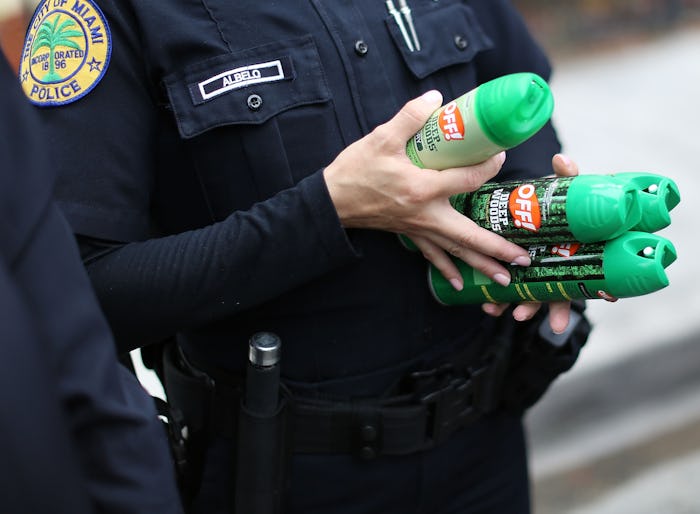Life

Can You Bring Mosquito Repellent On A Plane? You're Going To Want Protection On Vacation
What do I pack for my vacation? It's a question everyone asks themselves before heading out for a holiday. If you're heading south, the answer is usually something along the lines of swimsuit, shoes, money, one cute hat you're not going to wear but tell yourself you'll wear, books, and trashy magazines to read on the beach. That's how my packing list usually looks, at any rate. But since the spread of the Zika virus in the southern hemisphere, wary travelers have added another important item to their list: bug spray. But can you bring mosquito repellent on a plane these days?
According to the Federal Aviation Administration (FAA);
The total aggregate quantity per person cannot exceed 2 kg (70 ounces) or 2 L (68 fluid ounces). The capacity of each container must not exceed 0.5 kg (18 ounces) or 500 ml (17 fluid ounces).*
Aerosol release devices (button/nozzle) must be protected with a cap or other means to protect against accidental release.
This exception is for repellents that are sprayed/applied directly on a person's skin and clothing and as such are included in the exception for medicinal and toiletry articles. Insect repellents or insecticides designed to be sprayed in the air or at the insect are not included in this exception.
Mosquito repellent is an important tool in the struggle to avoid contracting the Zika virus, as the bite of an infected Aedes aegypti variety of mosquito causes the virus in humans. The Zika virus enters through the blood stream and can cause a host of neurological disorders, particularly in newborns who can contract the virus in utero. One of the most common diseases is microcephaly, a condition where the brain of a baby does not grow to full capacity and can affect the development of the child for the rest of its life.
The CDC recommends the following mosquito repellents as most effective:
- DEET (chemical name: N,N-diethyl-m-tolua-mide or N,N-diethyl-3-methyl-benzamide). Products containing DEET include, but are not limited to, Off!, Cutter, Sawyer, and Ultrathon.
- Picaridin (KBR 3023 [Bayrepel] and icaridin outside the United States; chemical name: 2-(2-hydroxyethyl)-1-piperidinecarboxylic acid 1-methylpropyl ester). Products containing picaridin include, but are not limited to, Cutter Advanced, Skin So Soft Bug Guard Plus, and Autan (outside the United States).
- Oil of lemon eucalyptus (OLE) or PMD (chemical name: para-menthane-3,8-diol), the synthesized version of OLE. Products containing OLE and PMD include, but are not limited to, Repel and Off! Botanicals. This recommendation refers to EPA-registered repellent products containing the active ingredient OLE (or PMD). “Pure” oil of lemon eucalyptus (essential oil not formulated as a repellent) is not recommended; it has not undergone similar, validated testing for safety and efficacy, is not registered with EPA as an insect repellent, and is not covered by this recommendation.
- IR3535 (chemical name: 3-[N-butyl-N-acetyl]-aminopropionic acid, ethyl ester). Products containing IR3535 include, but are not limited to, Skin So Soft Bug Guard Plus Expedition and SkinSmart.
If you're heading south this summer, it's important to be cautious about protecting yourself and your loved ones from mosquito bites. Avoid standing water (a breeding ground for the Aedes variety of mosquito), wear loose, light-colored clothing, and pack the best mosquito repellent you can find. It could be in short supply wherever you're traveling.